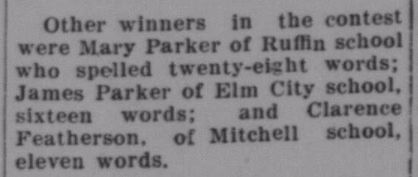Carter Washington Foster died 17 February 1955, deeply in debt.
Foster had been Wilson County’s Negro agricultural extension agent. To open his estate, his widow Estelle Duncan Foster testified that she had found his will among papers in a locked box at the National Bank of Wilson. Sadie H. Collins, Helen W. Branford and John M. Miller Jr. examined the paper and positively identified as the document they had witnessed Foster sign just a month before.

On 24 February 1955, Wilson County Superior Court opened the estate. Foster’s will was straightforward — he left all property left after his debts were settled to his wife and named her his executrix. The attachment to the will is more perplexing.
First, “I suggest that the $5000 Metropolitan Policy payable to my wife be loaned to the Company and payable to Carlotta and Barbara shall need same for schooling.” (What company? Was this suggestion lawful? Barbara Jean, born 1942, and Carlotta Estelle, born 1951, were the couple’s daughters.)
Second, Foster named three people who owed him a total of $30 — Isham Bryant, Leona Hines, and Maggie Bryant.
Third, he named eleven people that he owed a whopping $3007.50 (roughly $27,000 in 2017 dollars) — M.R. Zachary ($320), Mrs. Branford ($375), Percy Williams ($100), Mark Sharp ($825), Joe Hester ($650), Frank Murphy ($350), W.R. Barnes ($105), Cora S. Wilson ($75), Isiah Whitehead ($100), M.G. Garris ($25), and Martha Mitchell ($82.50). [As newspaper notices gave witness, attempts to pay them all back would require the sale at auction of Foster’s personal belongings, such as a 1951 Plymouth, and the house on Vance Street that he and his sister had inherited from their mother.]
Fourth, he designated seven people as trustworthy advisors to his wife — Bing Miller, Charles James, Rev. Farmer, Rev. Watkins, M.R. Zachary and Thomas J. Moore.

——
In the 1920 census of Wilson, Wilson County: at 707 Vance Street, Walter Foster, 46, fireman at wagon company; wife Rosa, 34; children Heneretta, 18, Carl [sic, Carter], 6, and Naomi, 4; and sister-in-law Etta Parker, 32, a school teacher.
In the 1930 census of Wilson, Wilson County: at 808 East Vance Street, teacher Rosa Foster, 42; children Carter, 16, Daily Times newsboy, and Naomi, 14; and two roomers Alice Jones, 36, and Mamie Key, 20, both teachers.

The 1939 Ayantee, yearbook of North Carolina A&T State University.
On 29 December 1939, Carter Washington Foster, 26, of Wilson, and Estelle Duncan, 25, of Maysville, North Carolina, were married in Danville, Virginia. Foster, son of Walter Foster and Rosa Parker, worked as an agriculture teacher at Chatham County Training School and lived in Siler City, and Duncan, daughter of Samuel Duncan and Annie Hicks, lived in Clinton, North Carolina.
In 1940, Carter Washington Foster registered for the World War II draft in Wilson. Per his registration card, he was born 15 January 1914 in Wilson; resided at 808 East Vance; worked as county farm agent at 559 1/2 East Nash Street; and was married to Estelle Duncan Foster.
This newspaper article about county officials reveals that Foster was paid less than half of his white counterpart’s salary:

Wilson Daily Times, 1 December 1941.
His work, alongside black home demonstration agent Jane Boyd, was recognized, however:

“Wilsonia” column, John G. Thomas, Wilson Daily Times, 24 January 1945.
Carter Washington Foster died 17 February 1955 in Saratoga township, Wilson County. Per his death certificate, he was born 15 January 1914 in Wilson to Walter Foster and Rosa Parker; was married; resided at 801 East Green; and worked as a county agricultural agent.


Wilson Daily Times, 18 February 1955.
——
- Sadie Collins — Wilson cafe operator Sadie Collins.
- Helen W. Branford — per the 1953 Raleigh city directory, Helen Wade Branford (1913-1994) was an agricultural extension agent living in Wilson.
- J.M. Miller Jr. — Wilson elementary school principal John Maxwell Miller Jr.
- Isham Bryant — Sampson County native Isham Bryant (1891-1961) was a machinist in Wilson.
- Leona Hines — Leona T. Hines (1901-1988) of Wilson County and later Lenoir County.
- Maggie Bryant — Wilson teacher Maggie Walker Bryant (1910-1958).
- M.R. Zachary — Hertford County native Molton R. Zachary was a classmate of Foster at A&T and was a county farm agent.
- Mrs. Branford — probably Helen W. Branford above.
- Percy Williams
- Mark Sharp — Wilson County farmer Mark B. Sharpe.
- Joe Hester — Granville County native Joe Hester (1900-1984) was a Wilson County farmer.
- Frank Murphy
- W.R. Barnes
- Cora S. Wilson
- Isiah Whitehead — Isaiah Whitehead Jr. (1894-1969) was a farmer near Tarboro, Edgecombe County.
- M.G. Garris
- Martha Mitchell — probably, Martha Taylor Mitchell (1895-1976) of Wilson.
- Bing Miller
- Charles James — undertaker Charles D. James.
- Rev. Farmer
- Rev. Watkins — Baptist minister Talmadge Adam Watkins (1915-2002)
- Thomas J. Moore
- Jane Boyd — in the 1940 census of Wilson, Wilson County: at 1111 Washington Street, Walter Thorpe, 63; wife Rebecca, 46; and roomer Jane Boyd, 37, Virginia-born county home demonstration agent.
North Carolina Wills and Estates, 1665-1998 [database on-line], http://www.ancestry.com.
























